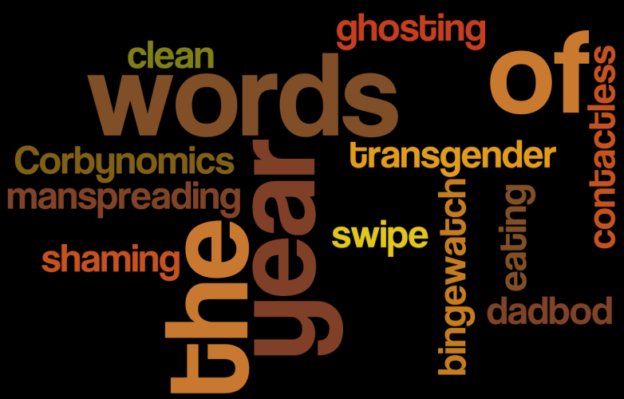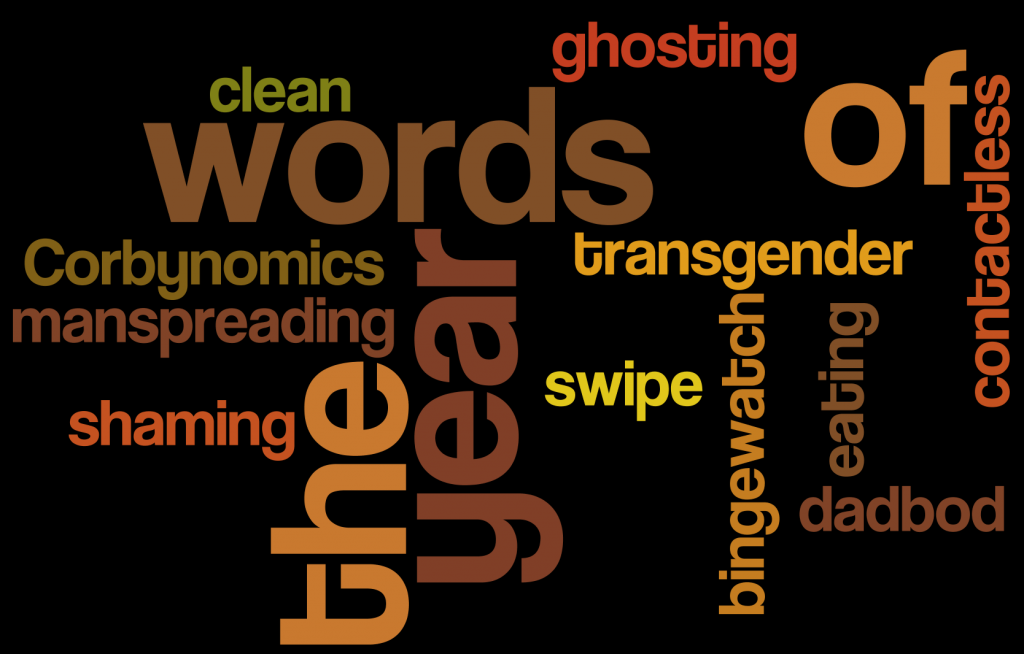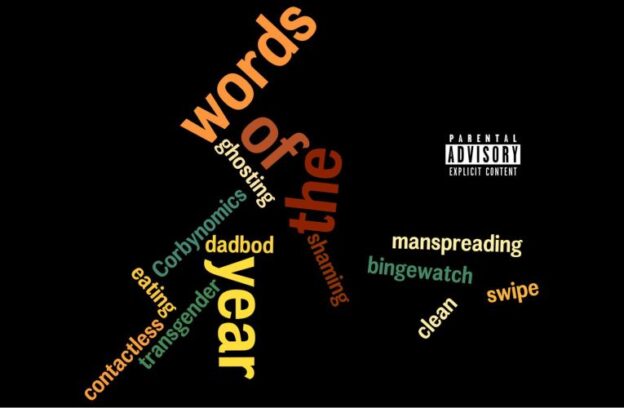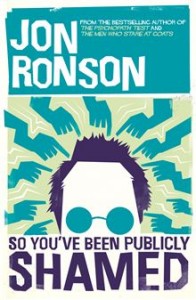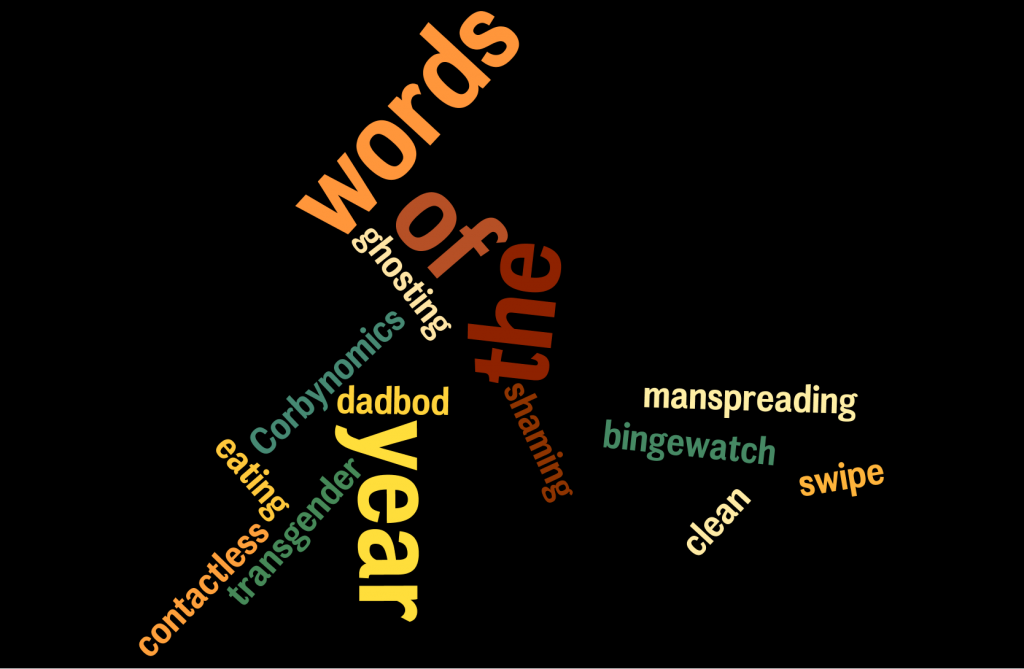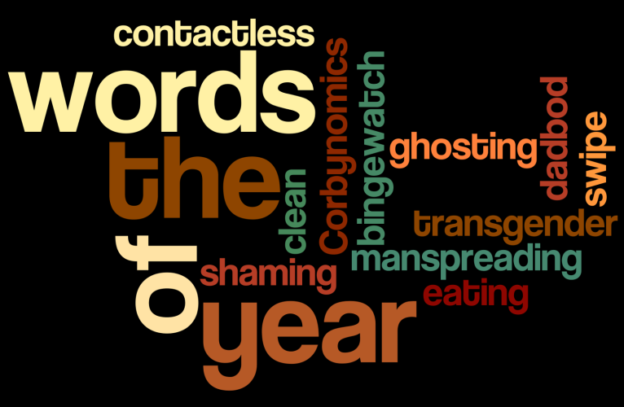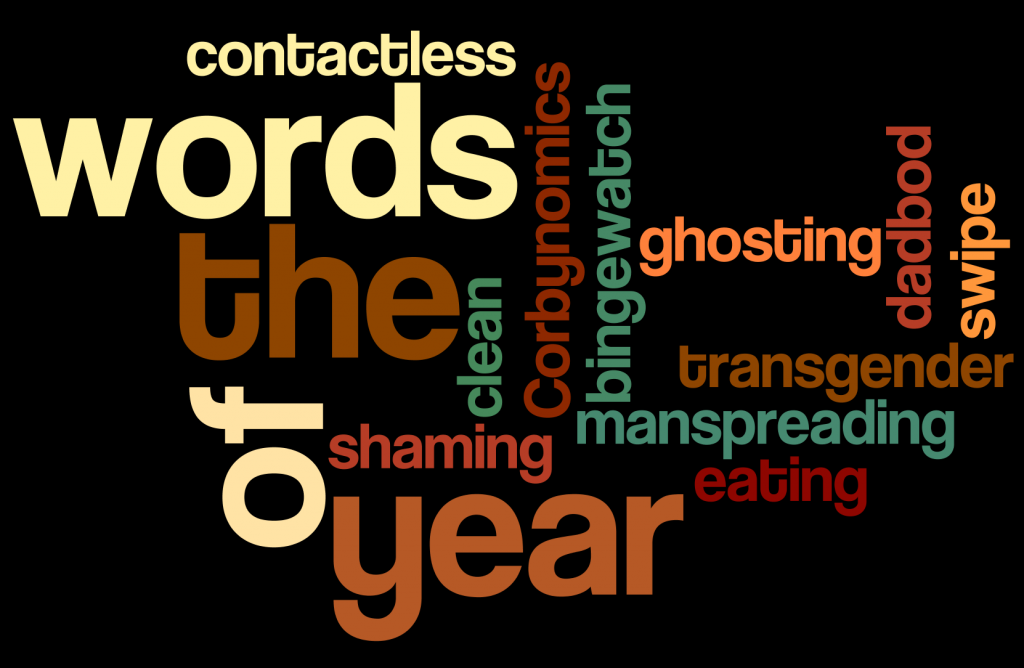More trending vocabulary and issues of the moment, this time focusing on topics like working conditions in the gig economy, the pros and cons of instagram and a true story about a unicorn riding a bike in London. Transcript available.
[DOWNLOAD]
PART 4 Transcript – 99% complete
Welcome back to this series about The Words of the Year. In the last 3 episodes I’ve been working my way through this list published by The Collins Dictionary online of 10 words which were used a lot in 2017. So far I’ve talked about fake news, antifa, Corbynmania, cuffing season, echo chamber, fidget spinner and gender-fluid. It’s been a bit of a tightrope for me to talk about some of those fairly controversial political topics and manage to cover the different aspects of the debates surrounding these concepts. But hopefully you’ve been finding it interesting and you’ve noticed lots of vocabulary – more than just the words of the year.
Most of what I’m saying in this series is written on the pages for these episodes on the website. I started preparing these episodes last year when Collins published their list and just never got round to recording it, but I’ve added more notes and ideas to this over the last 12 months and I’m happy to be finally putting my thoughts on record in these episodes. So do check out the pages for these episodes published on my website. If you go through all the stuff I’ve written, and perhaps try to read along as I’m speaking, it will make it easier for you to pick up bits of vocabulary that you’ll hear me using.
Generally, in episodes like this, I hope you are trying to notice little bits of language as we go along. That’s basically the point. I’m trying to provide you with a meaningful context in which you can discover or notice vocabulary which you can attempt to pick up and use yourself. The notes and scripts on the website should really help you to do that, as you can check spelling and paste new words and expressions into your word lists if you keep them. So I hope you use episodes like this as a chance to expand your vocabulary as you listen.
I’ve got 3 more words from the 2017 list to deal with and I think I’ll get that done in this episode, which is part 4 of the series. Then after this, it’s time to move onto the Collins Words of the Year for 2018! But thankfully I’ll have the help of my friend Amber Minogue (who, of course you know because she is a regular guest on the show). But let’s not get ahead of ourselves, let’s finish the word list from 2017 first.
Remember these are words or phrases which were used a lot in 2017 and which Collins selected also because they represent big issues that people were talking about or reading about in the media during 2017. All these issues are still relevant and significant today, except perhaps fidget spinners from the last episode, which I think are now old news and probably just a trend that peaked in 2017.
OK let’s carry on.
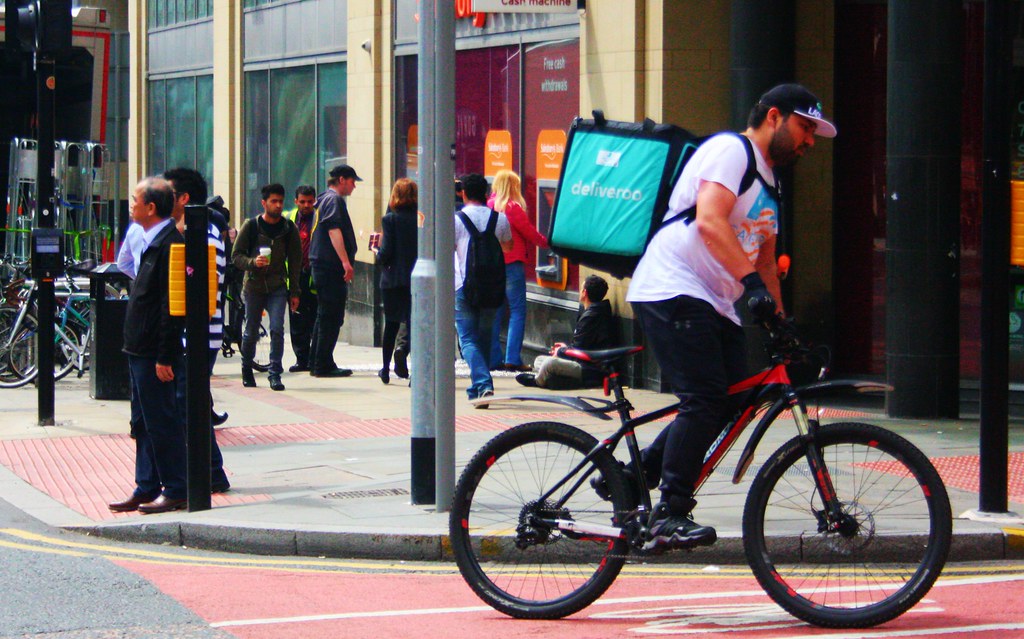 (the) Gig economy
(the) Gig economy
noun: an economy in which there are few permanent employees and most jobs are assigned to temporary or freelance workers.
This is all about the current job market in the UK (and elsewhere of course). It’s an economy – or employment market in which permanent work is getting more and more rare – I’m not really sure why.
Instead it’s more and more common to just have a series of temporary jobs, being employed on a freelance basis. The expression gig economy is used to refer to this situation in which people might just move between different temporary jobs, or perhaps work a number of little jobs at the same time. This is to be contrasted with the old idea that in your career you find just one permanent job with a company that employs you for life, or at least until you retire.
Nowadays there seems to be less job security, or perhaps just more flexibility than there used to be.
We’ve got a bit of vocabulary here about types of job, or types of contract and then we’ll break down the expression “gig economy” as well, which basically means just explaining what a gig is.
Let’s look at the difference between a permanent job and a freelance or temporary job.
“Hey, I got a new job.” Your friend might say. How do you respond?
“Oh, cool. Is it a permanent contract?”
“No, just temping” or “No I’m freelancing still, but it’s for 6 months, which isn’t bad”
- A permanent job / A permanent contract
- A temporary contract / Temping
- Freelancing
The advantage of a permanent job is that you get more security. You’re certain to have work and to be paid every month, but you’re committed to that job. With freelance or temporary work you have a bit more flexibility. You can probably say to employers “Hey, I’m not free for the month of April” or something and you can do whatever you want in April because there are no strings attached. But, why would you want to do that? You still need to pay the rent. You need to keep working, right? Usually temporary contracts are just not as good as permanent ones, unless for some reason you only want to work for a short period – like maybe you just want to work for the next 3 months before you go travelling or something.
The downside of temporary or freelance work is that because there’s not permanent contract, your employer can just say, “Oh, we’ve got no work for you next week, sorry” and you say “Oh, any idea when you will need me?” and they say “We’ll let you know” and then you’re facing a period of no work, and no money to pay the rent. It’s uncertain. What happens then is that in this situation you end up going around doing lots of little temporary jobs, perhaps doing different types of work, some part-time stuff, anything so you can pay the rent and pay for your mobile phone connection and your supply of basic essentials like food, water, shelter, clothing, wifi and hipster coffee. The gig economy refers to this situation, in which there are fewer permanent jobs and everyone’s just rushing around doing little gigs here, little gigs there.
Some more bits of vocabulary
a Gig – a ‘one-off’ job. It’s usually used to refer to a comedy show or a music show, by comedians or musicians. “I did a gig last night” or “You’ve been gigging a lot recently” or “What’s the worst gig you’ve ever done?” or “we went to a great gig last night” or “I’ve got a gig tonight”.
It’s also used more and more to refer to other types of work, e.g. just one-off temporary contracts. “I’ve got a gig at a startup company in town, doing their website. It’s a pretty good gig actually.”
The gig economy (collinsdictionary.com)
In July 2017 the UK prime minister, Theresa May, made a speech promising to support the increasing number of workers in the ‘gig economy’, where the flexibility of short-term and part-time working comes at the cost of having little job security and none of the employment benefits enjoyed by permanent members of staff.
Really, this refers to the fact that instead of doing one single permanent job these days, more and more people are doing multiple part-time jobs at the same time.
OK, so you get the idea.
This doesn’t mean that everyone is doing temporary work, it’s just that’s it’s more and more common. On the one hand this means we have a flexible workforce, but on the other hand it’s a situation in which there’s less and less job security.
What about where you live? Is there a gig economy there?
Zero-hours contracts
If you’ve spent any time in the UK and read any papers or listened to the news recently, you must have come across this expression.
This from the BBC’s website https://www.bbc.com/news/business-23573442
Q: What are zero-hours contracts?
A: Zero-hours contracts, or casual contracts, allow employers to hire staff with no guarantee of work.
They mean employees work only when they are needed by employers, often at short notice. Their pay depends on how many hours they work.
Some zero-hours contracts require workers to take the shifts they are offered, while others do not.
Sick pay is often not included, although holiday pay should be, in line with working time regulations.
Q: Why are they controversial?
A: There is concern that zero-hours contracts do not offer enough financial stability and security.
The ONS found that employees on such a contract worked an average of 25 hours a week.
However, about a third of those on zero-hours contracts want more hours – mostly in their current job – compared with just 10% of other people in employment.
The CIPD research found that 16% of zero-hours workers said their employer often failed to provide them with sufficient hours each week.
The ONS said that zero-hours workers were more likely to be women or in full-time education and aged under 25 or over 65.
Employees on zero-hours contracts also do not have the same employment rights as those on traditional contracts, and critics are concerned that the contracts are being used to avoid employers’ responsibilities to employees.
So the issue is that zero hours contracts just let employers have all the control and power.
They’re really awful for workers’ rights.
Co-working spaces – these are rather cool and groovy spaces where you can go and work. They’re often populated by young people doing freelance work, or perhaps people who need an office for a short period and don’t have one, so they use co-working spaces as flexible alternatives to having an office. The rise of co-working spaces shows us that the job market is changing and is becoming more temporary in nature. They’re cool spaces, but they can be a bit noisy and expensive long term. They’re one of the parts of the gig economy.
Some gigs you might need to do if you’re struggling to find a permanent contract: waiter, barman, barista in a coffee shop, cleaner, clerical worker (doing basic office work like filing or data entry) or just a job in Starbucks, Uber driver, Deliveroo cyclist, and many more…
These are all jobs that you might take if you’re a gig economy worker, perhaps doing several jobs at the same time during your working week, while also taking some kind of academic course in an attempt to get an edge in the job market.
It’s probably a slightly insecure and confusing way of life, being all these things at the same time. Perhaps it’s cool to have so much flexibility too. There might be a sense of freedom in it, but I wouldn’t want that kind of lifestyle as the father of a child… but maybe I do actually have that lifestyle. I teach part time at the British Council and the rest of my time is spent working mostly alone on my online English teaching projects, while also doing stand-up comedy in the evenings and taking odd little extra jobs on the side, like sometimes I do voice-over work, sometimes I do bits of comedy writing, sometimes some acting… Maybe I am a gig economy worker. If it wasn’t for the permanent contract at the B.C. I would feel a bit more insecure I think (although LEP Premium is starting to make it possible for me to have more financial security and I’m lucky enough that my wife also contributes to our family budget).
Collocations with gig economy
A gig economy worker
One in three gig economy workers juggle at least two jobs at the same time, according to a study by one of the world’s biggest insurance companies. (Independent)
Gig economy companies
More than a million workers in Britain’s gig economy risk losing more than £22,000 each from being wrongly labelled as self-employed, according to research that shows the dangers posed to people in fragile employment.
The insurance firm Zurich said forcing gig economy companies to classify their workers as employees rather than self-employed would mean automatic enrolment in a workplace pension. Under these rules, it estimates a typical worker aged 25 and earning £25,000 a year would receive a total of £22,000 in employer contributions by the time they retire. (The Guardian)
Gig economy practices (practices = things that are done, and the way they are done)
UK government delays possible reforms to gig economy practices
The Guardian-Dec 5, 2017
Reforms to the gig economy expected to improve rights for up to 1.1 million people have been delayed until next year, in the latest sign that Brexit negotiations are hampering domestic policy.
Do you know any examples of this?
Are you a gig economy worker?
 Insta
Insta
Adjective (slang): of or relating to the photo-sharing application Instagram
Some collocations/examples of ‘insta’ used as an adjective
insta friends
insta brand
insta trainer
Meet ‘Agent 00Fitness’: The unstoppable rise of the ‘Insta-trainer’
CNN-Dec 18, 2017
The most prominent American athlete to have picked up on the Insta-training trend is LeBron James, who has been posting workout clips for the past few years to his nearly 34 million Instagram followers.
Your Favorite Insta-Brand Just Launched Knits
Refinery29-10 hours ago
Welcome to our new bi-weekly column, Insta-Bait, where we highlight the brands taking over our feeds right now — because Instagram isn’t just a place where we DM memes to our friends and double-tap our style icons’ most on-point outfits, it’s where we discover new labels on the regular.
Do you use instagram?
Is it good for people’s mental health?
Instagram and mental health
Here is a reputable report about mental health and social media
https://qz.com/988765/instagram-fb-is-the-most-harmful-social-network-for-your-mental-health-but-youtube-goog-has-a-positive-effect-a-new-report-says/
 Unicorn
Unicorn
noun:
(1) an imaginary creature depicted as a white horse with one long spiralled horn growing from its forehead, regarded as symbol of innocence and purity
(2) a recently launched business enterprise that is valued at more than one billion dollars
Unicorns aren’t new, but their popularity on the Internet (and of course everywhere else now too) is a pretty recent development. This ancient mythical creature is enjoying a renaissance of its own right now, both in images created by amateur computer users and for products sold in stores. Are you seeing unicorns pop up on a daily basis across your Twitter feed, Tumblr dashboard, or Facebook page, and in reality just in front of your actual face in the real world that you can touch? (unicornsrule.com)
We know what a unicorn is, but why are they so popular and prevalent these days?
Examples:
Unicorn t-shirts
Images of unicorns and rainbows
Memes featuring unicorns and rainbows and stuff
What is a unicorn? It’s a mythical animal
What do they represent? (purity, strength, honour, freedom, being fabulous, rarity (they’re rare), beauty, innocence, things which are hard to come by these days – idealism of identity, freedom to be whoever or whatever you want to be, the knowledge that it’s impossible to find)
Sometimes they appear on flags – e.g. they’re actually the symbol of Scotland, appears on the UK royal coat of arms (chained up because they were thought to be dangerous if free – quite sad isn’t it? Or maybe they’re chained up because Scottish kings were so awesome that they were even capable of catching unicorns, so now they’re in chains to represent the awesomeness of Scottish kings)
Appearance in some films – Blade Runner, Legend
Sexual connotation – in the LGBT community – because they often appear with rainbows, they’re used as symbols of activism. You might see them being used in marches promoting the rights of the LGBT community.
There’s also some slang too – apparently a unicorn can mean a single, attractive, healthy, bisexual female who wants to have a relationship with a couple. So hard to find that they’re considered as rare as a unicorn.
In finance: A unicorn is a startup company valued at over $1 billion. A new company that is immediately valued really highly. The term was coined in 2013 by venture capitalist Aileen Lee, choosing the mythical animal to represent the statistical rarity of such successful ventures. According to TechCrunch, there were 223 unicorns as of March 2017.[6] The largest unicorns included Uber, Xiaomi, Airbnb, Palantir, Dropbox and Pinterest.[7]
Discussion Questions
Do you think they were ever real?
What is it about unicorns that captures people’s imaginations?
Why are they popular now?
Unicorn start up companies: Uber, Airbnb, Dropbox – do you use any of these?
A message from a LEPster featuring a unicorn riding a bike in London
Message:
Hi Luke,
I’ve often thought of writing to you or leaving you a comment on Facebook but a. I’m not much of a “social”/“public” person b. I didn’t feel like it, honestly.
Until now.
Two things have happened to make me write to you. I’ve currently moved to London and:
1. I saw your name in a tower of “missing” letters (or whatever they are) at the front gate of my new residence here and I find it funny.
*mental note: check how common the name Luke and the last name Thompson are in England
2. I saw a cycling unicorn.
Could sound weird but it’s London, you know. (I hope you do because it is my first time in London. I’ve been here just since late August and I’m still, happily, freaking out many times in a day.)
Well, long story short… Let’s get to the unicorn.
Friday. 16th November. 10:00 am. Near Hackney Central.
I was on the sidewalk [Luke: pavement, surely?] trying to cross the road when a man dressed up as a unicorn cycled past. I smiled, of course, (I’m quite expressive). What a happy moment, a unicorn on a bike. In the morning. Lovely. Suddenly, a woman (she didn’t look crazy although she probably was…) came up to me, quite angry, shouting:
– “Are you laughing at that unicorn?????”
Here is when you come in. At that moment I remembered one of your marvellous podcasts dedicated to Alan Partridge when you made the difference between “laughing at” and “laughing with” (thanks Luke. The same in Spanish but still thanks because many times it’s just the opposite. And mainly thanks for the English comedy you bring to our lives) So I said:
– “Not at, with…” (Quite shy…or scared…)
And the woman said (still shouting and in an angry mood):
– “Oh, good. Because if a cycling unicorn doesn’t cheer you up you are MISERABLE!!!”
And she was gone, like very offended… THE END.
I don’t know whether it’s been “life-live comedy” or what, but it did feel like a comedy sketch.
That’s all. I’ve just received a notification of a new Luke’s English Podcast episode (how appropriate! I’m glad you’re back) so I’m now going to do another thing that cheers me up apart from seeing a cycling unicorn: listen to your podcast. THANKS.
Dictionary definitions – Collins English Dictionary. Copyright © HarperCollins Publishers
Parts 5 & 6 with Amber coming soon (Words for 2018)
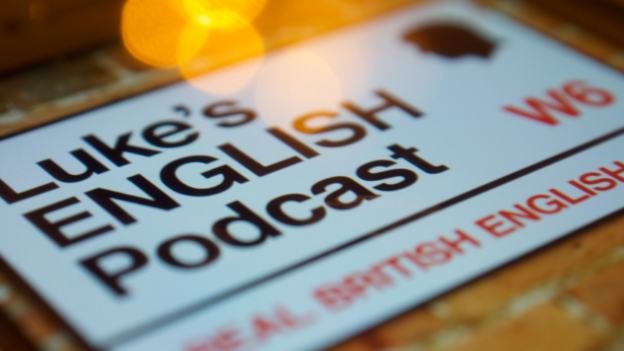

 (the) Gig economy
(the) Gig economy Insta
Insta
